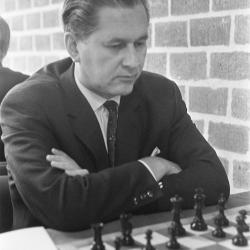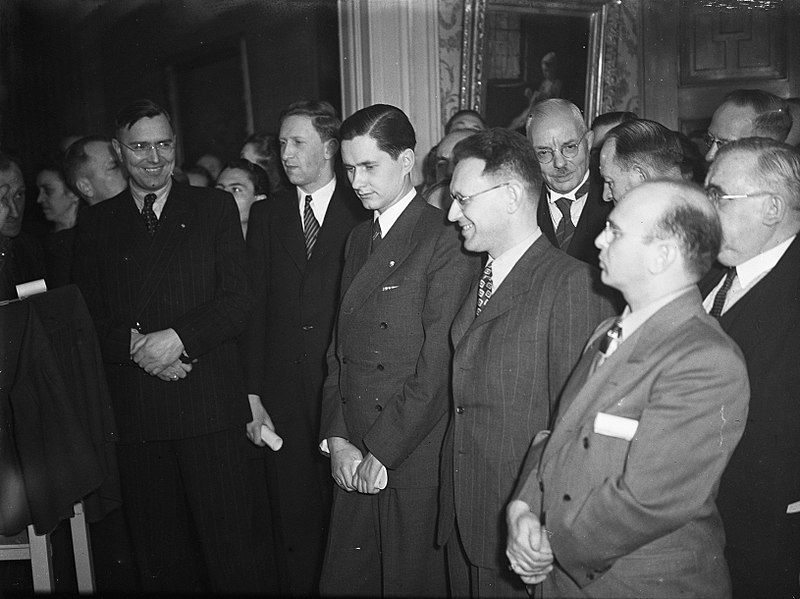GM Paul Keres

Bio
Paul Keres was a five-time Estonian and three-time Soviet chess champion. Although he never played in a world championship match, he is considered one of the top players never to become champion. The closest he came to achieving the pinnacle of chess was his third-place finish in the 1948 World Chess Championship tournament.
Early Life And Career
Keres was born in Narva, Estonia (then in the Russian Empire and later in the Soviet Union) in 1916. His brother Harald would become a noted physicist, but chess was Paul’s calling. By the time he was 19 years old, he was already the Estonian champion, having developed many of his chess skills in correspondence games. For example, this attacking game ends in a picturesque checkmate in 1931:
Winning the Estonian championship for the first time in 1935 was Keres’ breakout. He played Estonia’s first board in the 1935 Olympiad and from there ventured onto the international circuit.
An even larger breakout came in 1937 when he finished a shared or outright first place in tournaments at Tallinn, Margate, Ostend, Prague, Vienna, and Semmering/Baden. The last of these came by a +6 -2 =6 score in a double round-robin, a full point ahead of Reuben Fine, Jose Capablanca, Samuel Reshevsky, and Salomon Flohr.

Keres’ successes in 1937 led into his 1938 victory in perhaps the strongest tournament of all time. Played throughout the Netherlands, the AVRO tournament featured Mikhail Botvinnik, Max Euwe, and Alexander Alekhine in addition to Fine, Capablanca, Reshevsky, and Flohr. Keres never lost while defeating Reshevsky, Capablanca, and Fine (below); his resulting 8.5/14 score tied Fine for first place, and Keres won on tiebreakers.
After AVRO, Keres and Alekhine began negotiating a championship match, but World War II broke out and the match never materialized.
1948 World Championship
Even though the AVRO tournament was held in 1938, World War II so interfered with the international chess scene that its results were key to the organization of the world championship tournament held a decade later. But the champion Alekhine had died, leaving the match system untenable. FIDE, which had existed since 1924 but never before controlled the world championship process, organized a tournament instead.
Of the six surviving players from AVRO (Capablanca had also passed on), five were invited to the 1948 tournament and four attended: Keres, Botvinnik, Euwe, and Reshevsky. Vasily Smyslov took Flohr’s place, and Fine declined to play. The format was a quintuple round-robin.

Keres began with four decisive games, but two of them were losses. He again put up an even score in the second quartet of games, defeating Smyslov for the second time while also losing to Botvinnik a second time. Keres finally put up a positive score in games nine through 12, with two wins and a loss; the loss was his third to Botvinnik.
Games 13-16 doomed Keres. He defeated Euwe (who, with the only negative score, was the tournament’s metaphorical punching bag) but lost his other three games. Keres was now +0 -4 =0 against Botvinnik, who was well in the lead and coasted to victory over the final four games. Keres did finally beat Botvinnik in the last round but to no avail. With a +8 -7 =5 score, Keres finished at 10.5/20, matching Reshevsky but a half-point behind Smyslov and 3½ points behind Botvinnik.
This tournament has been the subject of much intrigue. Why did Keres have so much trouble with Botvinnik? Rumors have persisted that Keres was pressured to lose to Botvinnik, but nothing has ever been proven. Keres just as easily could have simply been outplayed. Botvinnik claimed in western media that he was asked to help fix the tournament but refused to do so and that his play made the difference. Unlike Botvinnik, who lived until 1995, Keres did not survive the Cold War, so we may never know his side of the story.
Candidates Record
After FIDE established the three-year championship cycle of interzonal and candidates tournaments, Keres was a regular presence there as well. Unfortunately, a series of close calls prevented him from ever obtaining a world championship match.
He came closest in 1962, tying for second place a mere half-point behind winner Tigran Petrosian. It was his fourth straight second-place finish, a scarcely believable string of close calls (although he was at least 1½ points back in the first three cases).
Paul Keres' results at the Candidates, 1950-65:
|
Year |
Place |
Score |
Winning Score |
|
1950 |
4th |
+3 -2 =13 (9.5/18) |
12 (Bronstein) |
|
1953 |
T-2nd |
+8 -4 =16 (16/28) |
18 (Smyslov) |
|
1956 |
2nd |
+3 -1 =14 (10/18) |
11.5 (Smyslov) |
|
1959 |
2nd |
+15 -6 =7 (18.5/28) |
20 (Tal) |
|
1962 |
T-2nd (Geller) |
+9 -2 =16 (17/27) |
17.5 (Petrosian) |
|
1965 |
QF loss |
+2 -4 =4 |
Spassky |
Keres, Petrosian, and Efim Geller drew all their games against each other in the 1962 Candidates. Soon after, Bobby Fischer accused them of doing so on purpose. Unlike the vagaries of 1948, it does appear that the trio agreed to draw their games and focus elsewhere, based on recounts from Yuri Averbakh and others. It is speculated that Keres’ age played a role in his agreement so he could conserve energy. (He was 46; Geller, 37; and Petrosian, 33.) Nonetheless, Keres may have won the right to play Botvinnik in 1963 had he played somewhat more aggressive chess.
Because of the 1962 controversy, the format of the candidates was switched to a series of matches beginning in 1965. Ending his streak of top-two finishes, Keres lost to Geller in the quarterfinal.
Late Career
The final candidates tournament of Keres’ career was in 1965. He continued to play competitively—and successfully—until the very end of his life.
Keres won his very last tournament in Vancouver, Canada. During his return trip to Estonia from that tournament, Keres died of a heart attack. It was June 5, 1975; he was only 59 years old. (His brother Harald, the physicist, would live until 2010 and the age of 98.)
Legacy
From his dominant tournament run in 1937 to his near-miss at the 1962 Candidates, and even the decade after, Keres was a top-flight player. He played against ten world champions, defeated nine, and held a positive score against three plus an equal score against another three. But he never became champion himself.

Stylistically, Keres began as an attacking player as early as his correspondence days as a teen. It remained his main strength throughout his career, but he could not have had so many successes as an attacker alone. (For example, see his victory over Fine at AVRO.) Nonetheless, the attacking variety constitutes his most memorable games, such as this 1955 annihilation of Laszlo Szabo.
Keres was also a successful chess author, writing a collection of his games in 1972 as Grandmaster of Chess and co-authoring The Art of the Middle Game with Alexander Kotov.
Keres remains a popular figure in Estonia—and with excellent reason. A tournament is played in his memory in Tallinn (and Vancouver) every year. Chess players in every country should remember his career and games.


